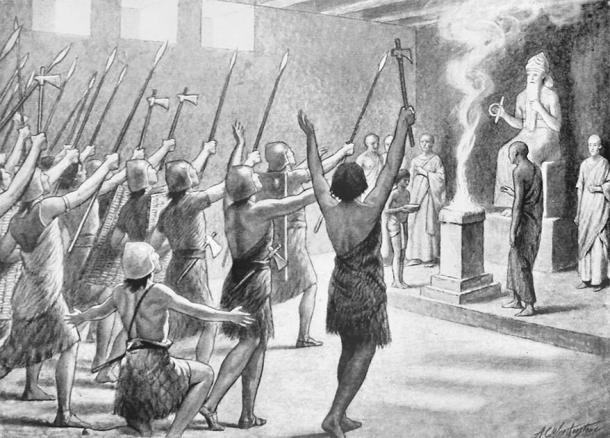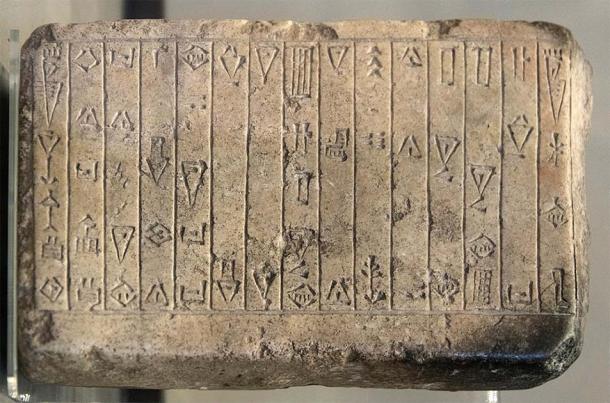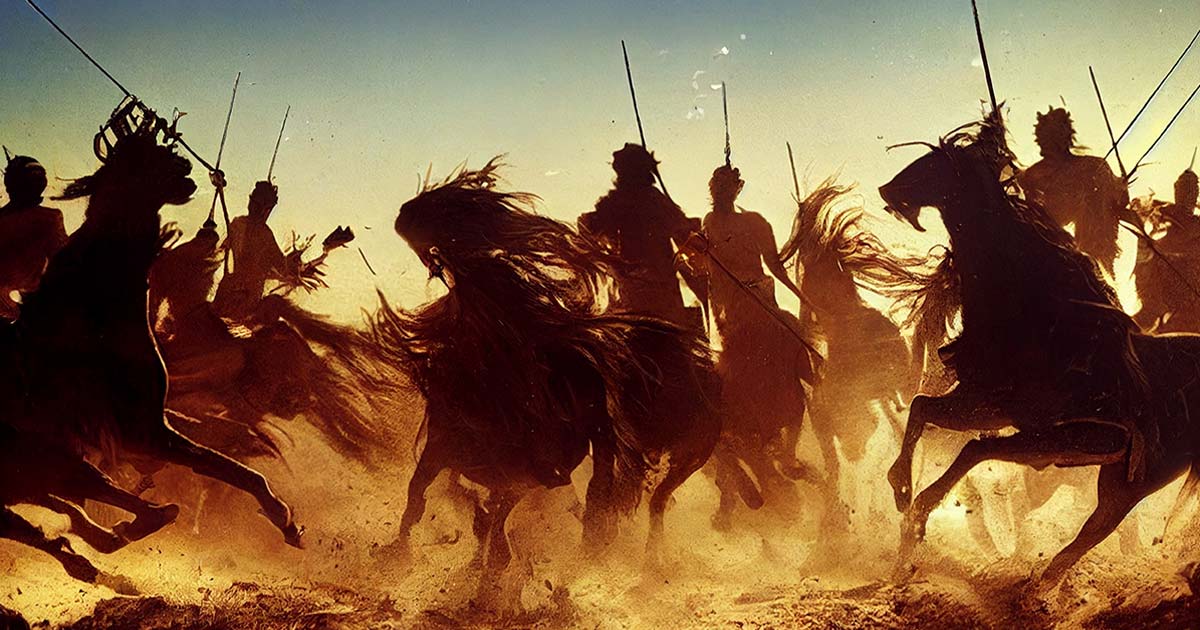The Gutian Invasion: What Really Caused the Fall of the Akkadian Empire?
The Akkadian Empire, one of the first great empires in human history, thrived in ancient Mesopotamia under the rule of Sargon of Akkad. However, its reign eventually came to an end. For decades, scholars have debated the role played by the Gutian invasion in its downfall. We know that around the 22nd century BC, the Gutians successfully invaded the Akkadian Empire, toppling the last Akkadian king. But were the Gutians solely responsible for the fall of Akkad or were other factors at play? Few things in history are simple, and that’s certainly true here.
Setting the Stage for the Gutian Invasion: An Introduction to the Akkadians
The Akkadian Empire was established by the legendary Sargon of Akkad in the 24th century BC, only to become one of the earliest and most influential empires in human history. It was based in Mesopotamia, a region known as the cradle of civilization. At its height the empire covered a vast territory spanning modern-day Iraq and Syria, as well as parts of Iran and Turkey.
Sargon of Akkad’s rise to power became the stuff of myth and legend, partly because he earned his position by uniting various city-states under his rule. Then, through military conquests and political maneuvering, he created what is often regarded as the first known empire, establishing a centralized government that extended its reach far beyond its predecessors. This empire was controlled by two entities, a ruling dynasty and an administrative bureaucracy.
- Explaining the Fall of the Great Akkadian Empire
- Rise of an Empire: Sargon of Akkad’s Epic Story (Video)
It was the Akkadian Empire’s unprecedented scale and administrative organization that set it apart from earlier civilizations. Sargon implemented a system of provincial governance, appointing officials known as governors to oversee local regions. These governors collected taxes, maintained order and ensured loyalty to the central authority. This centralized control allowed for efficient resource management and the establishment of a unified legal and economic system.
It wasn’t just how the Akkadian Empire was governed that made it special. It was also marked by impressive cultural and linguistic achievements. The Akkadians, who spoke a Semitic (Near East) language, introduced the Akkadian language, which then spread across the region. The Akkadian cuneiform script was widely adopted, which helped ease communication and the spread of knowledge across Sargon’s Empire. Long after the Akkadian Empire had fallen, its cultural and linguistic influence could be felt in the region.
Of course, an empire can’t spread through language alone. The Akkadian Empire was known for its military prowess, especially under leaders like Akkad. Its army was a formidable force that employed advanced military strategies and weaponry.
The Empire’s wealth meant that it could field well-trained and well-equipped soldiers as well as the latest and greatest military technology, like chariots. These advantages allowed for successful conquests and rapid territorial expansion. The empire's military might helped to maintain control over its vast territories and deter potential adversaries.
But, how did the Akkadian Empire pay for all of this? Well, the Akkadian Empire also made significant contributions to the development of trade and commerce. It was located in a logistically advantageous location between the Tigris and Euphrates rivers which helped the growth of agriculture and in turn led to surplus production. This surplus meant the Akkadians could support the growth of urban centers. Economic prosperity fostered trade networks that extended throughout the empire, as well as with neighboring regions.
So, the Akkadian Empire was a groundbreaking civilization in a whole host of ways, leaving an indelible mark on history. But, compared to the likes of the Greeks, Romans and Ottomans it’s not nearly as famous. Nor, lasting just 180 years, was it anywhere near as long-lived. Why? Well, that might have something to do with the Gutians.

Representational image of Sargon of Akkad, the first ruler of the Akkadian Empire. (Oleksandr / Adobe Stock)
Unravelling the History of the Gutians; Nomadic Conquerors of the Akkadian Empire
Which raises another question, who exactly were the Gutians and what did they have to do with the fall of the Akkadian Empire? They must have been pretty impressive to take down the world’s first empire after all.
The Gutians were a nomadic people believed to have come from a region known as Gutium, which is thought to have been located in the northeast of Mesopotamia, near the Zagros Mountains. Despite playing such an important role in ancient history, not much is known about the Gutians.
We don’t know for sure exactly where they came from, nor do we know much about their cultural practices. They’re usually described as nomads who probably lived a life that revolved around mobility, herding and raiding. This puts them in direct contrast to the Akkadians, known for their agriculture and urban centers.
From what we know of their social structure it is thought that the Gutians were most likely organized into tribes and/or clans with local leaders ruling over smaller territories. This decentralized system of governance would have allowed for a certain level of autonomy within Gutian society. There is evidence, especially after the fall of Akkad, that the Gutians also had kings, but little is known about how they ruled.
Why do we know so little about these fearsome nomads? The answer lies in the fact that, unlike the Akkadians and the other Mesopotamian peoples, they had no written language. Most of the information about the Gutians comes from later Mesopotamian texts, which don’t tend to show them in a very flattering light. They’re usually described as being barbaric and destructive invaders, highlighting their disruptive impact on the established order of the time.

Utu-Khegal, Prince of the Sumerian city of Erech, imploring victory against the Gutian king Tirikan. (Public domain)
The Gutian Invasion of Akkad
The exact year that the Gutians began attacking the Akkadian Empire is unknown, but we know from historical evidence and later records that it was around the 22nd century BC and began with a series of hit-and-run raids on various cities under Akkadian rule. The Gutian attacks came during a period of political and social turmoil within the Empire.
The state had already been weakened by several factors we’ll come to later and the Gutians took advantage of these vulnerabilities. Seeing from their raids that their enemy was weakened, the Gutians capitalized on the empire's instability and launched a full-scale campaign.
The invasion appears to have been brutal, swift and incredibly successful, resulting in the overthrow of the last Akkadian king, Shar-Kali-Sharri. The empire, which had once stretched across vast territories, now fell under the control of the Gutians. The Gutian rulers established their authority by appointing local kings to govern various regions, creating a fragmented and decentralized system of governance.
- Ancient Remains of Important Bronze Age City of the Akkadian Empire Found in Iraq
- A Dusty Demise for the Akkadian Empire
Just because the Gutians had managed to overthrow the Akkadian Empire, it didn’t mean they were ready to control its lands. Gutian rule over Mesopotamia was characterized by political instability and a lack of centralized control. The Gutian kings ruled as independent rulers over their respective territories, leading to conflicts and struggles for power. This fragmentation weakened the region and prevented the re-establishment of a strong central authority.
The Gutian invasion had far-reaching consequences for the Akkadian Empire and the region as a whole. It effectively ended the Akkadian Empire and marked the beginning of a new era in Mesopotamian history. The power vacuum left by the collapse of the empire allowed for the rise of new regional powers, such as the Third Dynasty of Ur and the subsequent Babylonian and Assyrian empires.

Impression of a cylinder seal from the time of Akkadian King Sharkalisharri, with the inscription “The Divine Sharkalisharri Prince of Akkad Ibni-Sharrum the Scribe his servant.” (Mbzt 2011 / CC BY 3.0)
Contributing Factors: Reasons for the Fall of the Akkadian Empire
With that being said, it’s important not to give the Gutians all the credit for the fall of the Akkadian Empire. The Akkadians and their leaders deserve their own share fair of the credit. Were the Gutians just in the right place at the right time?
Many historians believe environmental changes played a key role in the decline and eventual fall of the Akkadian Empire. As mentioned earlier, the Akkadians relied heavily on the fertile land that lay between the Tigris and Euphrates rivers for agriculture. Agriculture bolstered its economy and fed its massive population.
This reliance on one region of agricultural land left the Akkadians susceptible to environmental factors such as drought and changing river patterns. Both proved to be a problem in the Empire’s latter ears. Reduced rainfall and water scarcity led to crop failures, resulting in food shortages and economic strain. The inability to sustain a stable food supply likely caused social unrest and contributed to the overall decline of the empire.
If droughts weren’t bad enough, the Akkadian Empire faced problems related to changing river patterns. Over the years the courses of both the Tigris and Euphrates rivers shifted. This may have disrupted the Akkadian’s impressive irrigation systems that supported their agricultural production. Reduced irrigation would have made it difficult for farmers to maintain their fields, meaning decreased agricultural yields and further exacerbating food shortages.
These environmental changes would have had cascading effects on the economy, societal stability, and the empire's ability to sustain itself. People tend to get unruly when they are hungry, and nobles are less loyal to their kings when their wealth is dwindling.
It’s easy to see that while environmental change was not the sole cause of the Empire’s fall, it was a key factor. The inability to adapt to and overcome these environmental challenges weakened the Empire's agricultural foundation, destabilized its economy and likely eroded the Empire's ability to govern effectively.

Written in the Akkadian language, the Tablet of Lugalannatum mentions the rule of S’um, king of the Guitars. It has been dated to about 2130 BC and is now on display at the Louvre in Paris, (Louvre Museum / CC BY-SA 4.0)
Civil Unrest Contributed to the Decline of the Akkadian Empire
These food shortages lead us nicely to our next factor, civil unrest. During its twilight years, the Akkadian Empire grappled with internal unrest and political instability, which contributed to its decline.
The Akkadian system of rule relied on a loyal ruling elite including nobles and high-ranking bureaucratic officials. Both of these became discontent over time, which eroded the unity and effectiveness of the empire. This was made worse by power struggles and rivalries within the empire's hierarchy.
As the cracks in the Akkadian Empire’s system of rule became clear, local rulers and governors, appointed by the central government, began to assert their autonomy, and challenge the authority of the Akkadian kings. Why should they listen to him their king when they were being approached by neighboring nations who were offering them more power and wealth?
Life wasn’t easy for an Akkadian king. Civil unrest came with the job. After the death of Sargon, each successive king had to put down some kind of revolt before they could actually focus on ruling. Over time these revolts made the kings look weak and weakened the people’s trust in them.
- Sargon of Akkad: Familiar and Legendary Tales of a Famous Mesopotamian King
- How Climate Change Caused the World’s First Ever Empire To Collapse
A house divided against itself cannot stand. With various threats and factors closing in on the Akkadian Empire, civil unrest in various forms hampered its government’s ability to respond. For it also wasn’t just the Gutians the Akkadians had to worry about. The problem with being the big dog is there’s always someone looking to knock you down a peg and take what you’ve got. The Akkadians had plenty of enemies.
The Akkadian Empire faced external threats from other groups. For example, the Amorites, a Semitic-speaking people, launched military campaigns and territorial expansions, further straining the already weakened Akkadian state. Much like the Gutians, these nations smelt blood in the water and seized the opportunity to attack.
The Gutians were surely the biggest threat, but these smaller invasions served to put additional pressure on the Empire's resources, territories, and ability to defend itself, contributing to its eventual collapse. It’s easy to see how environmental change, civil unrest, and these external invasions all fed off of each other to cripple a once powerful empire.
The End of the Akkadian Empire and the Gutian Invasion
These problems might not have been so serious if the Akkadian Empire hadn’t grown so big. Once these cracks began to appear the Empire seems to have begun collapsing in on itself under its own weight.
The Akkadian Empire's extensive size and territorial expansion, while impressive, created administrative difficulties that contributed to its downfall. Governing such a vast empire wasn’t easy, requiring an efficient and organized administrative system, but the empire appeared to have struggled in this regard, especially after things began going downhill.
The challenges of maintaining control over diverse regions, coordinating resources, and ensuring effective governance strained the empire's administrative abilities. This resulted in difficulties in collecting taxes, enforcing laws, and managing local affairs, ultimately undermining the stability and cohesion of the empire. Something that only made the above civil unrest worse, and more difficult to put down.
So, did the Gutians end the Akkadian Empire? Yes, and no. The Gutian invasion did indeed mark a turning point, leading to the ultimate collapse of the Empire and the later fragmentation of power in Mesopotamia. One could say their invasion was the knockout blow.
But it could be argued they only landed that blow because the Akkadian Empire was already severely weakened. Economic difficulties, environmental changes, external invasions and administrative challenges had all taken their toll. A case of death by a thousand cuts.
The legacy of the Akkadian Empire, however, lives on in its cultural and linguistic contributions, as well as its influence on subsequent civilizations. The fall of the empire set the stage for new political powers to rise in Mesopotamia and shaped the course of future civilizations in the region.
Top image: Representational image of the Gutian Invasion of the Akkadian Empire. Source: Francis Valadj / Adobe Stock
References
Bressan. D. 20 October 2019. “Climate Change Caused the World’s First Empire to Collapse” in Forbes. Available at: https://www.forbes.com/sites/davidbressan/2019/10/30/climate-change-caused-the-worlds-first-empire-to-collapse/?sh=57738f2b44e1
Mark. J. 27 October 2021. “Gutians” in World History Encyclopedia. Available at: https://www.worldhistory.org/Gutians/
The Editors of Encyclopaedia Britannica. 12 June 2023. “Akkad” in Britannica. Available at: https://www.britannica.com/place/Akkad
Wilford. N. 14 August 1993. “Collapse of Earliest Known Empire Is Linked to Long, Harsh Drought” in The New York Times. Available at: https://www.nytimes.com/1993/08/24/science/collapse-of-earliest-known-empire-is-linked-to-long-harsh-drought.html

















